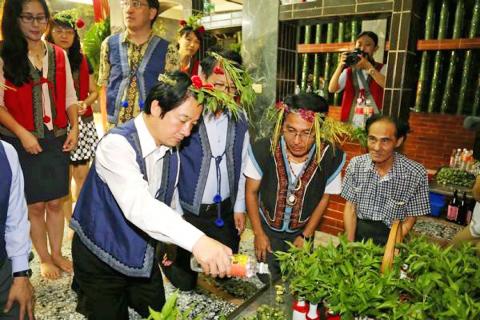The government yesterday approved a proposal to recognize Pingpu Aborigines as indigenous peoples, by amending the Status Act For Indigenous Peoples (原住民身分法) to restore their identity, and linguistic and cultural rights, in accordance with a policy of transitional justice advanced by President Tsai Ing-wen (蔡英文).
The decision to create a new community, known as Pingpu Indigenous People, was announced yesterday by the Executive Yuan following a meeting on policies and status laws regarding Pingpu communities, with deliberations by government officials, academics and representatives of Pingpu communities.
Some Pingpu leaders welcomed the news, hailing it as a “historic decision” for the government to finally recognize Pingpu communities as Taiwanese indigenous peoples, adding that it would open a new era for justice and equality for all the major ethnic and cultural groups in Taiwan.

Photo courtesy of the Tainan City Government
“We are very happy that the Executive Yuan pushed forward on this policy. It is time for Pingpu communities to regain their indigenous status, which they had possessed in the past. On behalf of the Pingpu Siraya community in Tainan City, I want to thank the central government for respecting the right to self-identity and for the recognition of their indigenous status,” Tainan Mayor William Lai (賴清德) said. “This is the first time we have had a positive response from the government on this issue, after decades of struggling and campaigning.”
“However, there is more work to do to promote the cultural identities and traditions of Pingpu communities to restore and protect their rights the same as those of other recognized indigenous peoples,” he added.
Other Pingpu campaigners said that there are still protracted negotiations and hard bargaining to be done with the Council of Indigenous Peoples (CIP) in the years to come, as the proposal requires an itemized examination of the Indigenous Peoples Basic Act (原住民族基本法) on affected rights and applications of Pingpu communities, after the process of amending the Status Act For Indigenous Peoples (原住民身分法).
There has been opposition to the recognition of some Pingpu communities as indigenous peoples to limit their privileges and rights, and government subsidies given to 16 of the recognized Aboriginal groups, activists said.
Pingpu Papora youth campaigner Aidu Mali from central Taiwan said her youth organization has been deliberately excluded from meetings between the Executive Yuan and the CIP over the past year.
“The proposal to create another category as ‘Pingpu Indigenous People’ was not what we fought for. It only gives us a superficial title and we fear that the CIP will work hard to stall on granting any indigenous rights. In the end, we could be denied our rights and excluded from the system again,” she said.
Ketagalan community Pingpu rights campaigner Chen Kimman (陳金萬) said that although he welcomed the development, he also warned that CIP officials, in their own self-interest, had chosen not to grant indigenous status to Pingpu communities, but had deliberately drawn out the process with legal amendments and protracted negotiations, which could drag on for many years and could be impeded by politicians and special-interest groups.

Chinese Nationalist Party (KMT) Chairman Eric Chu (朱立倫), spokeswoman Yang Chih-yu (楊智伃) and Legislator Hsieh Lung-chieh (謝龍介) would be summoned by police for questioning for leading an illegal assembly on Thursday evening last week, Minister of the Interior Liu Shyh-fang (劉世芳) said today. The three KMT officials led an assembly outside the Taipei City Prosecutors’ Office, a restricted area where public assembly is not allowed, protesting the questioning of several KMT staff and searches of KMT headquarters and offices in a recall petition forgery case. Chu, Yang and Hsieh are all suspected of contravening the Assembly and Parade Act (集會遊行法) by holding

PRAISE: Japanese visitor Takashi Kubota said the Taiwanese temple architecture images showcased in the AI Art Gallery were the most impressive displays he saw Taiwan does not have an official pavilion at the World Expo in Osaka, Japan, because of its diplomatic predicament, but the government-backed Tech World pavilion is drawing interest with its unique recreations of works by Taiwanese artists. The pavilion features an artificial intelligence (AI)-based art gallery showcasing works of famous Taiwanese artists from the Japanese colonial period using innovative technologies. Among its main simulated displays are Eastern gouache paintings by Chen Chin (陳進), Lin Yu-shan (林玉山) and Kuo Hsueh-hu (郭雪湖), who were the three young Taiwanese painters selected for the East Asian Painting exhibition in 1927. Gouache is a water-based

Taiwan would welcome the return of Honduras as a diplomatic ally if its next president decides to make such a move, Minister of Foreign Affairs Lin Chia-lung (林佳龍) said yesterday. “Of course, we would welcome Honduras if they want to restore diplomatic ties with Taiwan after their elections,” Lin said at a meeting of the legislature’s Foreign Affairs and National Defense Committee, when asked to comment on statements made by two of the three Honduran presidential candidates during the presidential campaign in the Central American country. Taiwan is paying close attention to the region as a whole in the wake of a

OFF-TARGET: More than 30,000 participants were expected to take part in the Games next month, but only 6,550 foreign and 19,400 Taiwanese athletes have registered Taipei city councilors yesterday blasted the organizers of next month’s World Masters Games over sudden timetable and venue changes, which they said have caused thousands of participants to back out of the international sporting event, among other organizational issues. They also cited visa delays and political interference by China as reasons many foreign athletes are requesting refunds for the event, to be held from May 17 to 30. Jointly organized by the Taipei and New Taipei City governments, the games have been rocked by numerous controversies since preparations began in 2020. Taipei City Councilor Lin Yen-feng (林延鳳) said yesterday that new measures by